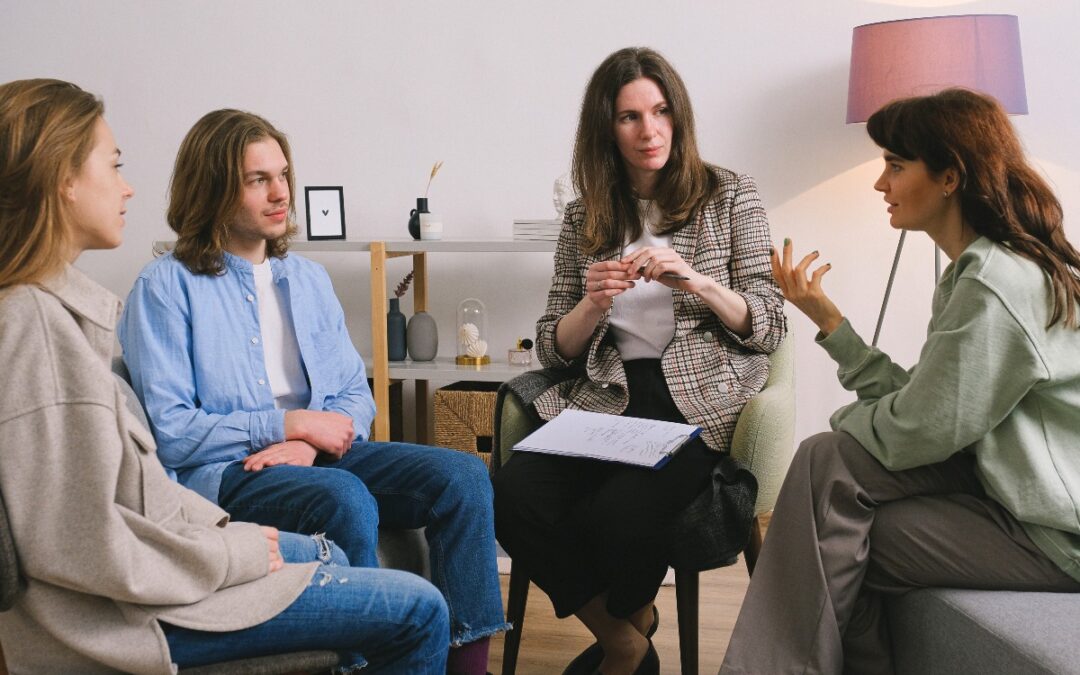Humans are social creatures. We are born into a group and join other groups as we grow. The people we spend time with and the values of the groups we are in affect our beliefs, choices, and health. It should be no surprise, then, how effective group therapy is. After all, it utilizes our natural inclination to be social and work with others.
In particular, group therapy helps us to learn new skills and coping mechanisms. For those of us recovering from addiction, this is very important. After all, drugs and alcohol are also commonly used to cope with emotions or stress. Therefore, to maintain our sobriety, we must learn new ways to manage without drugs and alcohol. Group therapy can help us to do so.
What Does Group Therapy Look Like?
Group therapy generally involves six to twelve clients working with one or two counselors. Groups meet regularly, giving us time to get to know others in our group. Of course, group therapy will look different depending on the treatment center, counselor(s), and who is in the group. The main goal, though, is the same: to improve individual skills and provide support for each person in the group.
Often, group therapy is offered as a part of different treatment options. These include inpatient, outpatient, or partial hospitalization.
Certain groups will focus on a specific topic. Others will cover multiple topics that relate to addiction treatment. The type of groups available will vary depending on the treatment center. Finding the right group for each of us is important. Being in a group where we feel comfortable and safe allows us to benefit the most from group therapy.
Benefits of Group Therapy in Addiction Treatment
Addiction treatment requires learning many new skills and making many changes in our lives. Being in a group can help us to do so by providing effective peer support. This decreases our feelings of isolation by helping us connect with others. These connections can help us stay sober as we commit to them and ourselves. We can gain hope from others and support them in their own journeys to sobriety.
Groups are also a perfect place for us to practice communication skills that will help us build a community outside of treatment. Learning to be honest with ourselves and others is the foundation of an authentic relationship with others. This may include being confronted or confronting others regarding behavior or addiction. While confrontation is often uncomfortable, it is necessary for working through problems. By learning to communicate during a confrontation, we can learn about ourselves and learn how to provide feedback to others.
Learning New Skills in Group Therapy
One of the primary benefits of group therapy is that it helps us to learn new coping skills. Learning to live a sober life will look different for each of us. It is no surprise that the coping skills we need to learn or improve may also be different. The process of learning benefits in many ways when we work with a group.
Getting Feedback and Support
Groups provide a place for us to get feedback and support from a therapist and peers.
When we voice our opinion, observations, or concerns with a group, we have the opportunity to get feedback. This feedback will provide us with information that will help us make changes. We also benefit from seeing the situation from a different point of view than our own.
Support from a group is equally as important as feedback. Addiction is commonly very isolating; by working with a group, we can connect with others. When we have supportive connections, we gain and maintain motivation for our new sober lives and habits.
Learning From Others While Improving Communication
While all of us in a group share common issues, each of us will have different strengths, weaknesses, and experiences. Working as a group, we can learn from each other to improve our coping skills.
This might look like learning a new coping skill from listening to someone else’s issues they are currently having and how they have managed them. We can also learn from dialogue with others in our group. Dialogue can help us to think of different methods of coping than we have considered before.
Practicing Skills
A group setting is a perfect place to practice many skills that we will need to cope in our lives. For example, if there is a conflict in a group therapy session, we can practice conflict resolution. The therapist leading the group can guide each member through this process.
While we may make mistakes, in a group, we are all learning. Part of the process of learning is making mistakes and trying new ways to manage and cope. These new coping skills take time to integrate into our lives. We may not be comfortable applying them in our outside lives yet, and that is okay. Practicing them in group therapy is the perfect place to start.
Group therapy is well-known to improve addiction treatment outcomes. In a group setting, clients learn how to communicate with others and practice new coping skills. This helps clients to stay sober long-term. Connections with others in the group can be motivating for the sober lifestyles we are working toward. Here at Dream Recovery, we understand that addiction is a maladaptive coping method. While each client’s treatment program will be unique, we offer group therapy as a valuable option. We place clients in a group in which they can learn and thrive, building skills to help them stay sober. If you are facing addiction, call today at (657) 216-7218 to learn how our programs can help you.


Recent Comments